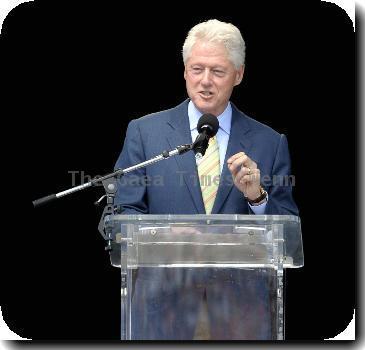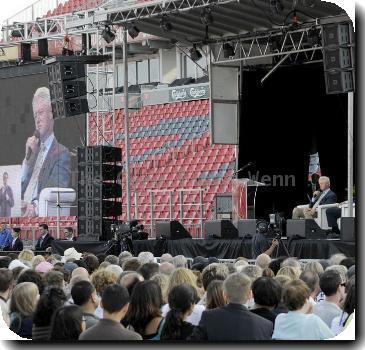American Airlines flight attendants, bitter over stalled contract talks, stage mock strike
By David Koenig, APWednesday, November 18, 2009
American’s flight attendants stage mock strike
FORT WORTH, Texas — Flight attendants for American Airlines, bitter over stalled contract negotiations, staged a fake strike Wednesday that included airport picket lines.
At Dallas-Fort Worth International Airport, picketing workers handed leaflets to arriving passengers and chanted slogans mocking the CEO. In the air, flight attendants wore red badges to indicate flights they believe couldn’t fly without them.
The rallies attracted media attention, and a few travelers paused to take in the scene, but the protests also underscored the union’s limited options.
Federal law deliberately makes it hard for airline workers to strike, and a true work stoppage is likely several months off — if it ever happens. It’s hard to know who the public would support if there was a strike. Union officials seemed keenly aware of that, and they have promised not to disrupt any flights during the upcoming holidays.
Further, American’s troubled financial situation puts the union at a disadvantage. American’s parent, AMR Corp., has lost $3.2 billion in less than two years, and revenue has fallen along with the drop in travel that accompanied the recession.
Laura Glading, president of the Association of Professional Flight Attendants, said the demonstrations were designed to “to show management that we stand strong together. American Airlines thinks that we’re just going to lie down and do nothing.”
The union, which represents 18,000 employees at Fort Worth-based American, organized similar protests at 12 other airports around the country.
Union leaders say flight attendants took a 33 percent cut in pay and benefits in 2003, when American’s employees accepted concessions to save the company from bankruptcy. Since then, they have received 1.5 percent annual pay raises from 2004 through 2008.
The union and the company have been negotiating a new contract since June 2008. Union officials say American has not made a proposal on wages.
American spokeswoman Missy Latham said the two sides have settled on nearly three-fourths of all contract items.
As for wages, Latham said, “Our flight attendants already receive near industry-leading pay and benefits.” She said the company wants a contract that “provides competitive pay and benefits and a good career for its employees.”
Latham said the airline industry has changed significantly in the last several years — most major U.S. carriers are losing money, not just American — “and we must recognize the competitive and business realities of the industry today.”
But there is lingering bitterness among American’s workers about stock bonuses paid to several hundred managers, including CEO Gerard Arpey. That inspired a chant Wednesday, “Arpey got the bonuses; we got the shaft.”
Chris Pompey, an assistant basketball coach at New Mexico State University, had just gotten off an American flight when he ran into the picketers.
“I shouldn’t be flying on American today,” he said. “I’m with the flight attendants. They’ve been good to me.”
The last strike by American’s flight attendants came in 1993. Veteran flight attendants remember it as a victory — President Bill Clinton forced the airline to submit to binding arbitration — and think it could happen again.
“Tensions are rising. People are fed up,” said Chris O’Kelly, chairman of the union’s Fort Worth branch. “We gave 33 percent to save this company, and executives keep getting bonuses and pay raises. It’s our turn.”
The two sides have met nearly 100 times, with more talks scheduled in December and January. The union is hoping to raise the pressure on American to settle then. If not, the union will ask the National Mediation Board to declare an impasse, which would start a 30-day countdown until the union and company can both resort to “self help” — a strike or lockout.
But the president and Congress can block a union that wants to strike, as Clinton did to American’s pilots in 1997.
At DFW Airport, Grant Asay, a hospital administrator in the Dallas area, watched the picketing flight attendants and suggested they shouldn’t strike.
“Airline service is pretty crappy. I’m not sure I’d notice” if they went on strike, he said.
Asay noted the airlines are still losing money despite planes being full. He said everyone, including employees, should be making concessions.

